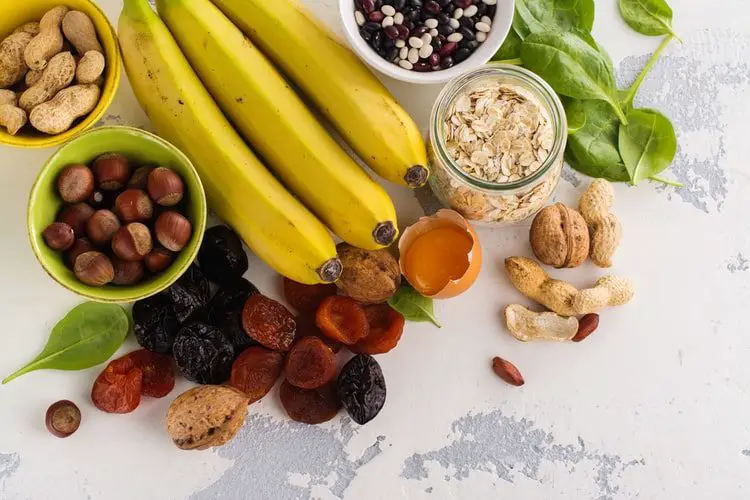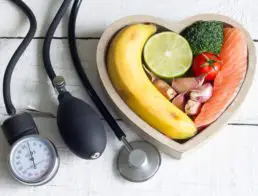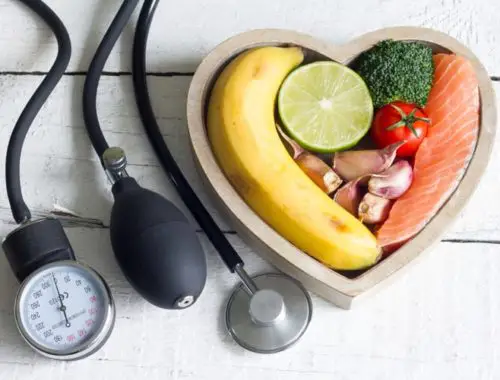Are you worried about low potassium? Maybe your doctor said your potassium is low. Or…you know it’s just “another thing” to think about when eating healthy.
No worries! We’ll talk about low potassium and what high potassium foods fit into a healthy diet.
What is potassium & what role does it play?
Potassium is a mineral we get in the foods we eat. It’s also an essential electrolyte in our blood.
We need potassium because it’s responsible for countless functions in the body (1):
- Moves nutrients and waste in and out of our cells
- Proper nerve function
- Muscle contraction
- Maintaining blood pressure by offsetting sodium
- Keeps your heartbeat regular
How to Tell if You Have Low Potassium
Your body works really hard to keep blood potassium levels within normal range. If potassium gets too low in your blood (called hypokalemia), there may be a bigger health issue.
Causes of Low Potassium & Groups at Risk (2)
- Excessive vomiting and/or diarrhea
- Altered kidney and/or adrenal gland function
- Taking diuretics or certain antibiotics
- Long-term laxative use
- Excessive sweating
- People with irritable bowel disease
- Those with pica
- Deficiency in magnesium
What does low potassium feel like (3)?
- Weakness (or paralysis in severe cases)
- Fatigue
- Muscle cramping or twitching
- Abnormal heartbeat
- Thirst and/or urinating more often
- Constipation (but not all constipation conditions mean you have hypokalemia; 4)
What to Do if You Think You Have Low Potassium
Low potassium levels can be dangerous, especially if you’re feeling abnormal heartbeats, paralysis and weakness.
Hypokalemia can be more serious when it affects your kidneys and other organs. Be sure to call your doctor right away if you experience any of these dangerous symptoms.
Foods to Eat for More Potassium
If you’re healthy, high potassium foods like the ones below can (and should) be added regularly into your diet (5). Check out how much potassium is in these foods (6)!
1. Bananas
Some people automatically think “bananas” when they think potassium. And for good reason! 1 medium banana has 422mg potassium (12% of men’s recommendation and 16% of women’s).
2. Vegetable Juice
Not a fan of veggies? Luckily they make some pretty healthy vegetable juices that are filled with potassium. Take the V8 Original Low Sodium 100% Vegetable Juice. It’s got 1250mg of potassium (37% of men’s recommendation and 48% of women’s). Get this great V8 Low Sodium Vegetable Juice and Healthy Greens bonus pack.
3. Sweet Potato
Eat both the orange sweet potato pulp and the skin! 1 medium sweet potato has 542mg potassium (16% of men’s recommendation and 21% of women’s).
4. Dried Apricots
Perfect snack or dessert for someone wanting to eat more potassium! Try these Ferghana Valley Apricots. A ¼ cup of these have 564mg potassium (17% of men’s recommendation and 22% of women’s).
5. Canned Pumpkin
For an easy potassium boost, open plain canned pumpkin and add it to smoothies and baked goods. A ½ cup of plain canned pumpkin has 253mg potassium (7% of men’s recommendation and 10% of women’s). Psst! Don’t use pumpkin pie filling!
6. Lentils
Dried lentils are a great plant-based nutrition source. I love these organic French Green Lentils (grab the big bag because they last, and it’s most cost-effective)! Plus, 1 ounce of these lentils contains 271mg potassium (8% of men’s recommendation and 10% of women’s)!
7. Beets
Not sure how to use beets? Try the canned version and add them to red velvet cake, smoothies or on sandwiches! 1 cup diced beets has 232mg potassium (7% of men’s recommendation and 9% of women’s).
8. Brussels Sprouts
These make a great side dish, especially if they’re roasted with herbs and spices! 1 cup Brussels sprouts has 342mg potassium (10% of men’s recommendation and 13% of women’s).
9. Potato
Just like sweet potatoes, regular potatoes are also a great way to boost potassium! 1 small baked potato gives you 722mg potassium (21% of men’s recommendation and 28% of women’s)!
10. Prunes
4 prunes have 232mg potassium (7% of men’s recommendation and 9% of women’s). Keep prunes on hand for constipation!
11. Beans
There are so many reasons that everyone should include beans in their diet! Plant-based protein, fiber and… potassium! Different types of beans have different nutrition, but ¼ cup of navy beans has 420mg potassium (12% of men’s recommendation and 16% of women’s).
12. Tomatoes
Slice ‘em, puree ‘em, roast ‘em or eat them plain! 1 small tomato has 216mg potassium (6% of men’s recommendation and 8% of women’s).
13. Salmon
My favorite way to eat salmon is shredded salmon tacos! 1 cup of salmon has 608mg potassium (18% of men’s recommendation and 23% of women’s). Plus, salmon has tons of heart-healthy omega-3s.
14. Yogurt
A standard 6-ounce, single-serve yogurt has 398mg potassium (12% of men’s recommendation and 15% of women’s). For heart health and weight loss, choose lowfat or nonfat yogurt.
15. Artichoke
Have you ever eaten artichokes besides in spinach-artichoke dip? Try roasted artichoke! 1 cup artichokes has 644mg potassium (19% of men’s recommendation and 25% of women’s).
Make Sure You Get Enough Potassium per Day
Wondering how much potassium you need per day? Click here for our article that’s all about it.
If you’re concerned about your potassium intake, make sure you also read about how to flush salt and sodium out of your body. Sodium and potassium need to be balanced in order to stay healthy!









